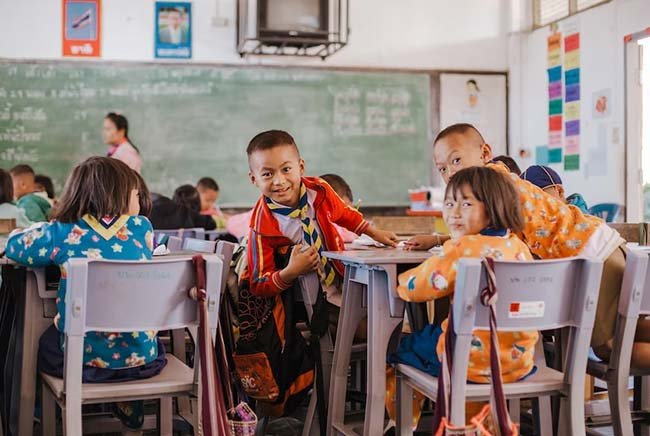Many people choose to move to Thailand due to its tropical beaches, enchanting neighborhood, and distinctive landmarks. Moving to an entirely different country is easier as an adult, but things tend to be more challenging when family, especially children, and International School is involved.
Expat kids in Thailand will need to adapt to a new culture while they’re in their formative years. While it would undoubtedly enrich their experience, it can still be tremendously stressful and confusing for them. Enrolling them in international schools, like Bangkok Prep International School, would make adapting much easier!
When it comes to international schools in Thailand, you are truly spoilt for choice. However, the main concern is how to pick the right school for your kid! Read to know the answer.
What Is An International School?
International schools in the country tend to have extremely high education standards and are accredited by external bodies. They almost always have small class sizes, modern facilities, and an impressive range of extracurriculars. These schools are predominantly aimed at kids of Thailand expats who want to continue their education with as little disruption as possible while they’re in the country.

In Thailand, where the education system is deemed lacking, international schools appeal to affluent Thais who want their kids to receive more highly-regarded international education. As a result, most international school student bodies are multicultural and diverse.
To locals, international schools are the big league in education, making the competition extremely fierce. They are predominantly focused on English, though there are options to study other languages, including Thai.
There is a mix of international schools in the country. The majority of them are in Bangkok. However, you can also find excellent ones in Chiang Mai, Khorat, Phuket, and Chonburi.
What Curriculum Do International Schools Follow?
Chances are that your first move in looking for a school is to find one that provides a curriculum of your native country. That is especially true for those only staying there temporarily or if your child has already spent a long time in that education system.
Though, don’t feel the need to be obligated. Choosing a curriculum that suits your child’s abilities and skills is always best.
Aside from the host country’s curriculum, international schools in Thailand have three main categories; the American, British, and International Baccalaureate (IB).
The American Curriculum mainly covers a broad range of courses to provide a more well-rounded education and focuses on assisting students in making the most of their talents. The British Curriculum, on the other hand, is heavily student-centered and highlights achieving clear standards and goals. Lastly, the IB Curriculum sets a high standard for achievement and emphasizes critical thinking, creativity, and cooperative learning.
Aside from those three, other curriculums are much less common. A handful of international schools offer French, German, Australian, and Singaporean Curriculums.
What Should You Consider When Choosing For An International School in Bangkok?
Bangkok’s vibrant and diverse international school scene provides high-quality and world-class education opportunities for expat families. However, expect the demand to be high and the competition fierce.
The country’s aspiration to be the centre for international education in Southeast Asia helped increase the number of schools. That made choosing much harder.
You should find the time to pick the right international school for your kid. Before making a decision, consider the following things:
Tier System
Thailand schools, primarily international ones, are ranked based on a three-tier system.
Tier 1 is made up of the best of the best. They boast national accreditation and typically have multiple international accreditations. Though, you can expect that the fees at these schools are high.
Tier 2 schools are mostly owned by a conglomerate or a group of investors. They are slightly cheaper than the ones under Tier 1. Finally, Tier 3 schools generally serve more affluent Thais than expats.
Accreditation
You must choose a school that complies with all international standards regarding safety, education, payment structure, teachers, and other best practices. These factors are necessary to ensure that the child learns in a proper environment.
Various international organizations are willing to accredit international schools. Some of the larger organizations are:
- Worldwide Education Service (WES)
- Council of International Schools (CIS)
- Centre for British Teachers (CfBT)
Teachers
When it comes to studying in international schools, western-educated teachers are in high demand as they are well-versed and experienced in teaching the western curriculum. Many international schools tend to advertise the fact that their teachers come from prestigious academic backgrounds.
Class Size
For class size, the smaller tends to be better. Choosing a school that won’t offer a big classroom filled with students would be best. The smaller class size ensures that your child receives proper attention from their teachers and staff.
Extracurricular Activities
Extracurricular activities involve everything non-academic related, like school trips, sports, and performing arts. Choose a school that best caters to your kid’s interests and passions.
While shortlisting the schools, choose ones that offer extracurriculars that would suit your kid’s talent. Some international schools provide various after-school sports, while others promote social work.
Conclusion
Choosing and deciding on the right international school for your kid is challenging. Thailand offers a wide range of choices, with some of the best in Bangkok. Remember that it all comes down to your kid’s educational needs.
Since the country is working on becoming the most influential player in the Southeast Asian education market, its government is also lending its support to developing these educational institutes.
No matter which school you choose, ensure that your kid is happy with your decision, as they are the ones to be most affected by it.




